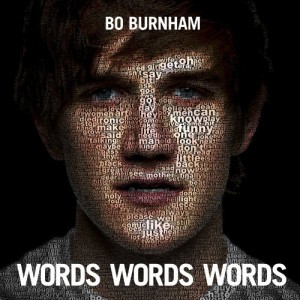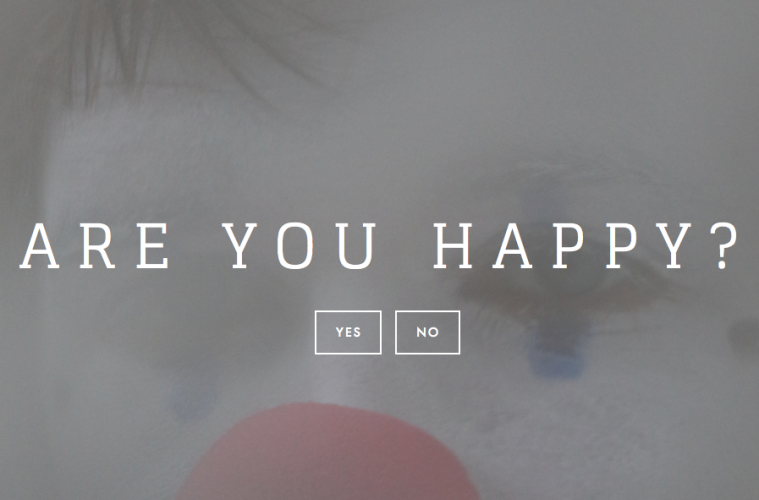Disclaimer: This rant is part geek out, part retrospective, and part confusing meta-talk, which is pretty much exactly as Bo might want it (I think).
Last night, my boyfriend and I went to see Bo Burnham live at the Shubert Theater in Downtown Boston. For those of you who don’t know who Bo Burnham is (and I confess I didn’t actually know who he was until last year), here’s a quick synopsis that does not do anything about him justice: he’s an American comedian, singer-songwriter, actor, and poet who grew up in the Boston area and achieved his first taste of fame from his Youtube videos. His Make Happy Tour is currently traveling around the country. He’s best known for his introspective comedy that comments on social media and social culture, celebrity culture, and even the nature of performing and comedy itself. I’ve listened to his two albums and watched the recording of his comedy show what., so when the opportunity presented itself to get tickets for his Make Happy Tour, I was beyond on board.
As I was getting ready for the show last night, I thought I knew what I was getting into. I knew the kind of irreverent, ironic, meta-humor he usually dished out. I was excited. I was prepared.
In short, I was not.
 The first half of the show was unremarkable because it was exactly what I expected from a comedy show: a great opener by someone I’d never met (his name was Adam Newman; check out his work if you’re a fan of jokes about werewolf dicks and self deprecation), and then Bo hit the stage. For those of you who have never seen his show or heard his humor, it’s more than comedy. It’s a musically rendered, light spectacular, humorous romp through one man’s inner psyche, and it’s a performance about the art of performing. The thing about Bo that you have to keep in mind is that he’s simultaneously introspective, raunchy, and playing a part. But that part, ironically enough, is himself, and sometimes it’s hard to dissect which parts of his skits are raw truths, and which are exaggerations of grains of truth. Sometimes they overlap, and do so with such seamlessness that you as an audience member become lost in the muddle, which is exactly what happened to me.
The first half of the show was unremarkable because it was exactly what I expected from a comedy show: a great opener by someone I’d never met (his name was Adam Newman; check out his work if you’re a fan of jokes about werewolf dicks and self deprecation), and then Bo hit the stage. For those of you who have never seen his show or heard his humor, it’s more than comedy. It’s a musically rendered, light spectacular, humorous romp through one man’s inner psyche, and it’s a performance about the art of performing. The thing about Bo that you have to keep in mind is that he’s simultaneously introspective, raunchy, and playing a part. But that part, ironically enough, is himself, and sometimes it’s hard to dissect which parts of his skits are raw truths, and which are exaggerations of grains of truth. Sometimes they overlap, and do so with such seamlessness that you as an audience member become lost in the muddle, which is exactly what happened to me.
During his last song, there was this part where, after he sings about his hand not being able to fit inside a Pringles can, and that all of his ingredients didn’t fit into a burrito (I promise, it’s hilarious when he says it), the song dips into something very real when he confesses that he’s in a toxic spiral of a relationship with his fans; he needs us, he wants us to love him, he fears us, he can’t handle our presence. The song made me want to cry. Not because I was insulted, not by any measure. But because I got it. I understood, almost at a molecular level. As an artist myself, I understand the insecurity of wanting to simultaneously put out something you’re proud of and something that’s meaningful, that people will pay attention to, and ideally, hopefully not hate. I totally get that insecurity. But when there’s no balance between making a fandom happy and making yourself happy, which gives way first?
And then that same sadness, that same meta moment of “oh my god, am I watching a performance deteriorate before my eyes?” happened again. During a heavier moment, when Bo crouched in front of the stage and turned up the house lights so we were seeing each other on an almost equal playing field, and was trying to have what I felt to be a real heart-to-heart with the audience, one fan called out, “We love the idea of you!”, which is a callback to a joke made in response to a heckler at an earlier show. At this point, Bo just sighed and replied, with something I almost interpreted as resignation, “Yeah, this is still the monologuing portion of the show.” And it struck me that this fan, who was basically making a meta-heckle, didn’t get what this moment was actually about. Instead of understanding that this was something real, something beyond fans and performers enjoying a joke, she turned it into a callback, a joke about a joke. But Bo didn’t seem to be joking.
When the show ended, and when we got our souvenirs, I noticed a group of fans clustered around the stage door, waiting with baited breath for a chance to catch a glimpse of the performer as he was leaving the show. At a younger age, I might have been one of them. But yesterday, as I looked at the gaggle of eager groupies standing there at the door like orphaned puppies trying to catch a new owner, I felt an overwhelming sense of unease, and, now that I know what it was, pity for them, and pity for him. Not that I have any right to feel that way, or to judge how other fans express their appreciation for a person or piece of art they respect, but after hearing his entire show, and listening to that very real moment when he brought the lights up and told us, point blank, that if we could avoid ever having an audience, we should, I realized that the fans were doing exactly what he didn’t want them to do. Or exactly what his words intimated terrified and worried him. Weren’t we perpetuating this weird, almost cultish hero worship? But if that’s not what fans are supposed to do, what are we here for?
I have no qualms with saying that I love his art, but even saying that I respect him as an artist or have any sense of him as a performer is both wrong and somehow fake. And by telling us that we don’t really know who he is (and he’s right), and by ensuring that we’re never quite sure where the joke is going to land, or if it’s going to land at all, he invites us to feel that way, by not only ripping off the veil of celebrity but tearing it to shreds while also somehow, miraculously, retaining it…? He provides something more than comedy. He provides an introspection on what it means to enjoy a comedy show, watch a performer, or even be a fan of something.
The whole way home, and well into this morning, I was left grappling two significant questions. What does it mean to be a fan? What does it mean to be part of a fandom, anyway? I thought I knew, especially last night. A fan is someone who enjoys, is devoted to, or supports someone or something. Simple enough, right? But as I sat there at the show, listening to the younger fans sitting around me cheering and whooping for Bo on stage, I realized I didn’t want to be a fan, not like this. How was it supposed to make me feel, when in a raw moment, the person that you’re trying to appreciate as a fan tells you, through the veil of what seems to be a sketch but turns into an incredibly raw moment between a performer and his audience, that he’d rather not have an audience, and that he’d rather not have you there, looking at him, watching him, waiting for him to be funny?
It’s not a secret that other fandoms deal with infighting and toxicity, which is why I mostly try to stay out of “fandoms” and just appreciate art, music, and other aspects of artistic culture on my own terms. But I’m also usually happy to gush about things I love with other people who have similar interests. That’s the point, isn’t it, of being a fan in the first place? To appreciate something, and to hopefully join together with other people who appreciate the same thing? But Bo made me question all that. Never before have I felt such sympathy for a performer, shouting out from the void in thinly veiled humorous terms that being a celebrity is terrible, and that if he could take it all back, he might. Or was it all just an act meant to make an audience full of twenty-somethings, his peers, in fact, living in his old stomping grounds and around the same age as him, think twice about what it really means to “love the idea of someone?”
I’m not really sure what all of this means, or if it’s even a testament to idea of being a fan. I just needed to rant about it. And the great thing about Minerva is, that as a fan, or as a geek or a nerd or an enthusiast or supporter or whatever the fuck I am, that I have a place to rant about things that are important to me.
Huh, how meta. And exactly how social media was intended to be used. Maybe Bo would be proud.
Header image via boburnham.com. Image of Bo Burnham via Lyrics Wikimedia.


